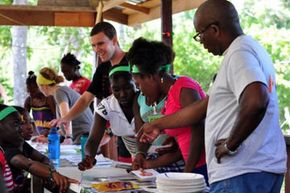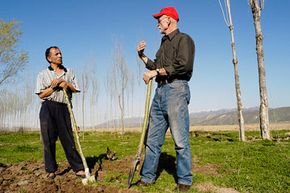When most of us think of the Peace Corps, we picture fresh-faced and idealistic college graduates heading off with their backpacks and hiking boots to make the world a better place. But is this an accurate representation of today's Peace Corps volunteer?
In the fall of 1960, then-Senator John F. Kennedy called upon college students to "serve their country in the cause of peace by living and working in developing countries" [source: Peace Corps]. After his election, President Kennedy signed an executive order creating the Peace Corps on March 1, 1961. He envisioned a civilian service corps in which college students would spend two years after graduation to aid developing countries [source: Grabianowski]. Since then, more than 200,000 volunteers have served in 139 host countries, lending their efforts to everything from education and HIV/AIDS prevention to environmental conservation and youth development [source: Peace Corps].
Advertisement
Over the years, the composition of the Peace Corps has changed to reflect times. In 1966, the 68-year-old Lillian Carter, mother of President Jimmy Carter, began her service in India [source: Peace Corps]. In 1985, female volunteers outnumbered male volunteers for the first time in Peace Corps history; in 2011 women make up 60 percent of the volunteer base [source: Peace Corps].
In 2011, as the first wave of baby boomers turns 65 and approaches retirement, many are seeking new experiences and looking for ways to give back to society. The average age of a Peace Corps volunteer is 28, but volunteers age 50 and older now account for 7 percent of the volunteer force [sources: Peace Corps].
The number of older volunteers continues to climb even as the overall number of Peace Corps volunteers has dropped from its peak of 15,000 in 1964 to around 8,600 in 2011 [sources: Weiner, Peace Corps]. But the application process is still competitive, and the Peace Corps continues to receive more applications than there are positions available. So does the Peace Corps want these retired volunteers to join its ranks? Read on to find out.
Advertisement




